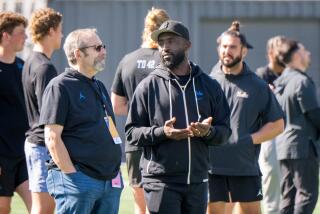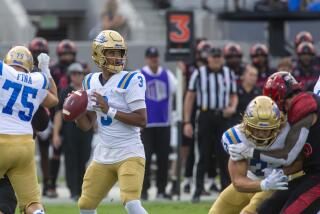CHIEF ENGINEER
- Share via
He’s a cross between Wilford Brimley and Grandpa Walton, crusty but lovable, wise enough to wrap his messages in humor that is most often aimed at himself.
Purdue Coach Joe Tiller peppers his speech with expressions such as “dang-gum” and “tinker’s dam.” He chooses his practice clothes for comfort, not effect, and the wide-brimmed Panama hat he wears to ward off the sun would look comical on most other coaches.
Somehow, it’s perfect for Tiller. Like him, it’s different, with a definite flair. It flouts style and conventional wisdom and the sometimes too-serious business of college football, just as Tiller has done with the Boilermakers.
Under his guidance, Purdue on Monday will make its first Rose Bowl appearance since 1967 and the second in school history. Before he arrived from Wyoming in late 1996, the Boilermakers had losing records in 11 of 12 seasons; they had gone to only one bowl game since 1981 and hadn’t won one since they defeated Missouri in the 1980 Liberty Bowl.
“I said when I signed on at Purdue that I understand our goal was to build a competitive football team and position us to play in this game,” he said.
But no one expected the turnaround to be so swift.
With rubber-armed quarterback Drew Brees racking up passing yards like an odometer gone berserk, the Boilermakers have earned four consecutive bowl invitations, the longest streak in school history. But being in Pasadena is a dream for Tiller, who is 58 but at heart remains the scrappy kid from Toledo, Ohio.
“We still find ourselves getting up and pinching ourselves each morning to make sure we’re really here,” said Tiller, who led Purdue to two Alamo Bowl victories before losing the Outback Bowl in overtime to Georgia last Jan. 1.
The 14th-ranked Boilermakers are here to face the fourth-ranked Washington Huskies because Tiller assembled some obviously skillful players, such as Brees, receivers Vinny Sutherland and John Standeford and running back Montrell Lowe. And because he found niches for others with less obvious skill: He turned Matt Light from a so-so tight end into an impressive tackle and gave the too-small, too-light Seth Morales a chance to become a quick and clever receiver.
Most of all, they’re here because Tiller made them believe in him, in their coaches and themselves.
“Coach Tiller and I have been through a lot together. He’s been a great motivator and great teacher,” Brees said. “He always knows what to say to get you relaxed, and off the field he always knows what to say to motivate you.
“His motivation is to tell you the facts. Guys playing this game sometimes get so uptight, you don’t think. He gets you to relax and think more clearly. He always knows what to say at the right moment and brings us back to reality. He’s able to keep us at a pretty even level.”
Said Sutherland: “He doesn’t yell. But you know when to have fun with him and you know when it’s time to get down to work.”
It always seems time for Tiller to poke fun at himself.
At the Rose Bowl coaches’ news conference a few weeks ago, Tiller joked that unlike Washington Coach Rick Neuheisel, he wasn’t fortunate enough to win the Rose Bowl.
“I was disappointed as a freshman in 1927 that Montana State didn’t win,” he said.
Asked how he had transformed a downtrodden program into a winner, he credited good fortune and a kind schedule in his first season.
“We did not play Ohio State or Michigan. Coming out of Wyoming, in Cheyenne Frontier Days, if you’re looking at this, we’d call that a good draw,” he said.
“I’m not sure we said anything different than the previous staff, but maybe you’ve won some games and have some credibility. Since I’ve been coaching, we had only one major injury. It was the opposite my first year at Wyoming--we had 23 major surgeries. We’ve stayed healthy.
“The other reason is the coaches and our golden-locked hair and baby-blue eyes and intelligence.”
Tiller, an All-American guard at Montana State, was drafted by the Boston Patriots of the American Football League but didn’t sign. He spent one year with Calgary of the Canadian Football League before returning to Montana State as an assistant coach.
He moved to Washington State in 1971 as an assistant coach, first with the defensive line and then as the offensive coordinator and offensive line coach. From there, he went back to Calgary for nine seasons, as an assistant coach, interim coach for six games, assistant general manager and director or administration and player personnel.
“I went to the Canadian league at age 28 to try to position myself for a job in the NFL,” he said. “Marv Levy had come out of the Canadian league to the NFL, Bud Grant, and Jim Finks did in a management role. There were a number of CFL guys who basically used the CFL as a springboard to the NFL. After talking to a number of people, I decided to go.
“I left the CFL because after being there for an unbelievable nine years in one city in what we fondly regarded as a revolving-door league, I had had my fill of dealing with the professional athlete. I think I belong in college football.”
He went to Purdue, where he was an assistant head coach, defensive coordinator and defensive line coach under Leon Burtnett. He went to Wyoming in 1987 as an offensive coordinator and defensive line coach for two seasons, then back to Washington State for two seasons.
He was appointed head coach at Wyoming in 1991 and took two years to lift the Cowboys above .500. Tiller was 39-30-4 in six seasons, including a 10-2 record and the 1996 Western Athletic Conference title.
His trademark became his prolific offenses. Every year since 1991, his teams have ranked in the top 30 in passing offense and total offense.
“This is our 14th year in the offense, and we have a lot of confidence in it,” he said, referring to his staff. “Because we came from Wyoming and it’s been known in the state of Wyoming to have swings in the weather, you can successfully implement this offense no matter the weather. It’s been productive with a variety of different players behind the center. . . .
“Fans in Wyoming would have lynched us if we’d gone back to the wishbone. Given the chance, I’d probably be a power-I coach. But I got some advice early on in my career, and that’s don’t try to be someone you’re not.”
He’s open-minded, but not a pushover, and he is secure enough to delegate responsibility.
“He enables you to do your job,” said offensive coordinator Jim Chaney, a former Cal State Fullerton assistant who followed Tiller to Purdue from Wyoming. “He’s not looking over your shoulder to see if you’re doing it. He’s a very trusting person and he treats you fairly. So many places, I’ve seen assistant coaches get berated on the field, but Coach Tiller treats us fair.
“I hope I can work for Coach Tiller for years to come. He’s very supportive of his coaches, maybe because he was one of us for years.”
He trusts Brees, too, and has earned the quarterback’s respect.
“It definitely goes just beyond a player-coach relationship on the field,” Brees said. “I’m up in the coach’s office a lot, not only to watch film but to joke around. I’m walking by and he always seems to look up as I’m going by and say, ‘Brees, get in here.’
“He always has something to tell me or some little fun fact to pass on.”
He has emphasized he wants his players to enjoy their Rose Bowl experience, not just the game. They may never get this chance again. He knows. It took quite a while for it to come his way.
“I think it’s really important that they enjoy the moment,” Tiller said. “To make a little play on words, it’s important they have time to smell the roses.”
More to Read
Go beyond the scoreboard
Get the latest on L.A.'s teams in the daily Sports Report newsletter.
You may occasionally receive promotional content from the Los Angeles Times.











